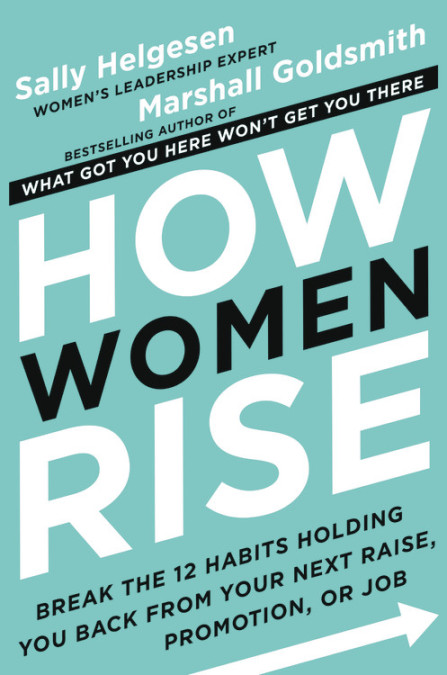Men and women alike engage in self-sabotaging behaviors in the workplace – but, according to author and leadership expert Sally Helgesen, there are certain habits more likely to hold women back in their careers. Her book, How Women Rise, co-authored with leadership coach Marshall Goldsmith, details 12 of these self-imposed roadblocks that prevent women from achieving their true potential.
“The behaviors we’re talking about here are not unique to women or men, but they are the behaviors that are most likely to get in the way as women seek to move higher,” says Helgesen.
Three of the 12 habits are particularly self-limiting, including a reluctance to self-promote, an unwillingness to utilize their relationships and, perhaps most common of all, minimizing.
Habit 1: Reluctance to claim their achievements
Women often shy away from self-promotion, even when they’re performing at the top of their game, which raises the question: Why?
Helgesen finds that women’s reluctance to toot their own horns can come from a misplaced moral concern. They view promoting their achievements as crass and obnoxious. In their view, it is better to take the high ground by staying silent. In reality, she says, they’re actually falling on their own swords and potentially missing out on an opportunity to convey useful information as well as gain visibility for their achievements.
“Whenever you hear someone say, ‘Well I’m not the kind of person who…’ then they’re setting up a kind of a moral superiority framework for themselves that’s probably not ultimately serving their interests,” she says.
Yet women who take an all-or-nothing approach to self-promotion actually fall into the trap of binary thinking.
“One of the things I most often heard is, ‘Well if I have to act like that jerk down the hall to get noticed around here, no thank you,’ Unfortunately, this self-limiting belief sets up an either/or situation that puts you in a lose-lose position.”
Solution: Find a middle ground
A critical step in overcoming this detrimental mindset is becoming aware of the problem, then pushing yourself to expand your view of self-promotion. Moving past either/or thinking helps unlock other options by empowering you to promote your achievements in a way that feels authentic.
“You’re not either going to copy the behavior of the most self-serving, self-important blowhard in the organization or just keep your mouth shut and expect everything to be noticed. You need to find a middle ground. How can you not become the blowhard and not shy away from your achievements? That’s a more empowering question. It also helps to treat what you do as information that could be useful to your team, your boss or your organization rather than just being all about you.”
Habit 2: Building rather than leveraging relationships
Helgesen also discovered in her research that, while women excel at building strong relationships, many don’t allow themselves to benefit from these connections. Much like their reluctance to claim achievements, women are hesitant to leverage their network for their own interests because they don’t want to seem like they’re using people.
“Rising in our career by engaging people to help us in a reciprocal way is the ultimate win-win. Unfortunately, women are often reluctant to do this because they don’t want to be seen as users. Once again, this form of binary thinking is unhelpful and undermines our success,”
Solution: Believe in your own value
Helgesen challenges women to flip their notion of networking on its head by placing more value on what they bring to the table. Rather than feeling averse to “burdening” a business contact by asking for a favor, view it as a gift.
“If you feel like asking for help is always a form of using others, then you’re not really seeing yourself as a player who could be a very valuable resource to them in the years ahead,” Helgesen says. “In addition, research shows that the primary reason people help others is that doing so makes them feel good about themselves. So why deprive people of an opportunity to feel good about themselves by potentially helping you?”
Habit 3: Minimizing
When people “minimize,” they use words and body language that unconsciously undercut their own significance and abilities. Compulsively apologizing is one minimizing behavior many women tend to exhibit, as well as language such as “this will only take a moment,” “this is probably silly, but…” or “I just have one quick question.”
“By framing whatever you’re saying in a way that proactively diminishes its importance – because you’re saying it may not be important, for example, ‘this will just take a second’ – you’re implying that you don’t really have the right to be here, because your idea is not that sufficiently compelling to take up even the tiniest bit of time,” says Helgesen, who notes that minimizing behavior is especially detrimental to those in leadership positions, or those hoping to position themselves as leaders.
“You can think you’re being a nice person by minimizing, but ultimately, people either disregard what you’re saying because you seem to as well, or they can read it as not very trustworthy.”
Solution: Enlist the help of others
If you notice that you have a tendency for minimizing, enlist other people in your professional network to help pinpoint your challenges and hold you accountable. This could look like taking a co-worker aside before a meeting and asking them to note your minimizing behaviors, or perhaps asking a mentor to honestly evaluate how you regularly minimize in your interactions.
By engaging others in your self-development, you’re more likely to “make long-term, sustained, positive behavioral change,” says Helgesen, who adds that this technique also opens up productive conversations in the workplace.
“It’s a very small thing, but it can be a strong force for positive cultural change, because you’re creating an environment in which people have permission to acknowledge their own vulnerabilities and ask for help, which means other people have a stronger role in helping each other achieve their highest potential. And none of us can achieve our highest potential on our own – we all need help to do that. That sends a powerful message and represents a place where I want to live and work.”


